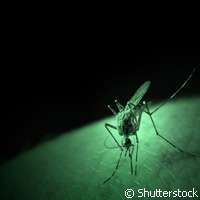Fight malaria by letting mosquitoes grow old

If you were asked 'How would you help curb malaria?', would you consider answering 'by letting mosquitoes mature and breed'? Probably not, but a new international study led by the University of Surrey in the UK shows that this could be a potentially effective solution. The findings are presented in the journal Proceedings of the Royal Society A.
A group of researchers, headed by Dr. Stephen Gourley from the university's Department of Mathematics, used mathematical modelling to investigate why the insecticides used to fight insects that transmit malaria can quickly lose their effectiveness in areas of intensive use.
These pesky bugs are able to beat insecticides currently available on the market. Experts say that spraying mosquitoes before they grow up imposes intense selection pressure favoring resistant insects.
Mosquitoes are currently exposed to chemicals including dichlorodiphenyltrichloroethane (DDT). This approach may provide great results in the short run, but its indiscriminate action accelerates the insect's resistance to the insecticide.
Scientists believe that a new insecticide that kick-starts into action later rather than sooner could slow this process and result in insecticides that remain effective for a longer period of time.
Under this latest plan, people would be at risk of being infected by mosquitoes that are older, due to a relatively long latency stage. The delayed action insecticide therefore will not trigger a jump in infection rates while the younger insects remain alive.
Using the mathematical models, the researchers could predict how effective an insecticide is once the mosquitoes have laid their eggs. Their results show that resistance develops much more slowly since there is less selection pressure on resistant mosquitoes.
The outcome of their work could help drive efforts and lead to unique advances in the control of this disease. It should be noted that while an increase in the number of mosquitoes is expected, they would be malaria-free bugs.
'There is a trade-off between effective prevention of malaria transmission by mosquitoes and having to live with mosquito bites involving no malarial transmission,' Dr. Gourley says.
According to World Health Organization (WHO) data, nearly 1 million people died of malaria in 2008, with most cases reported in sub-Saharan Africa. Around 50% of the world's population is at risk of being affected. Malaria was present in 108 countries and territories 3 years ago. The disease is responsible for 20% of childhood deaths.
The good news is that malaria is both preventable and curable. The best available treatment is artemisinin-based combination therapy (ACT). The researchers note that it is worth a shot to allow the mosquitoes to mature, thus resulting in fewer deaths.
More information: Gourley, S., et al. (2011) Slowing the evolution of insecticide resistance in mosquitoes: a mathematical model. Proc. Royal Soc. A, published online 19 January. DOI: 10.1098/rspa.2010.0413
Provided by CORDIS
















